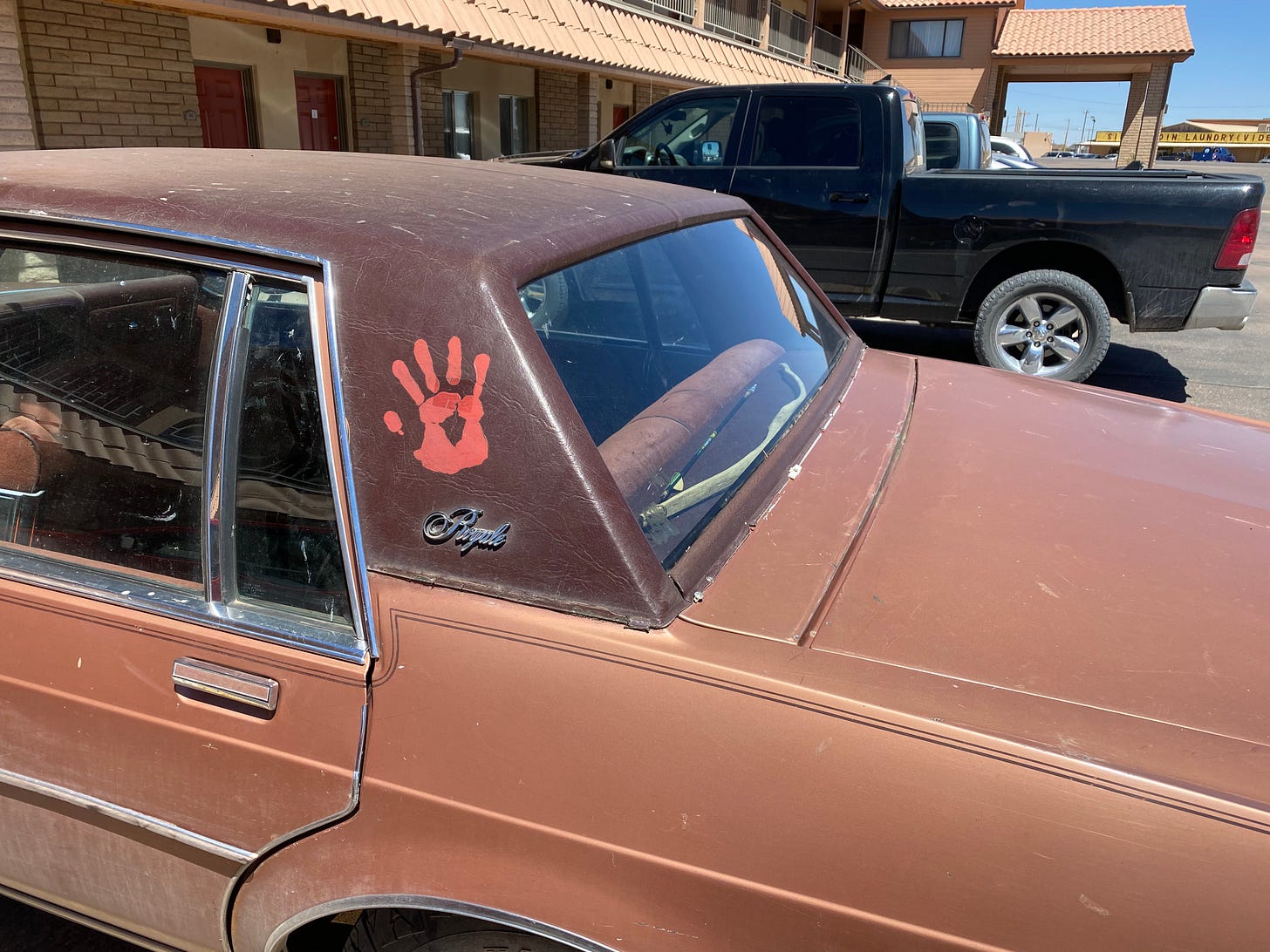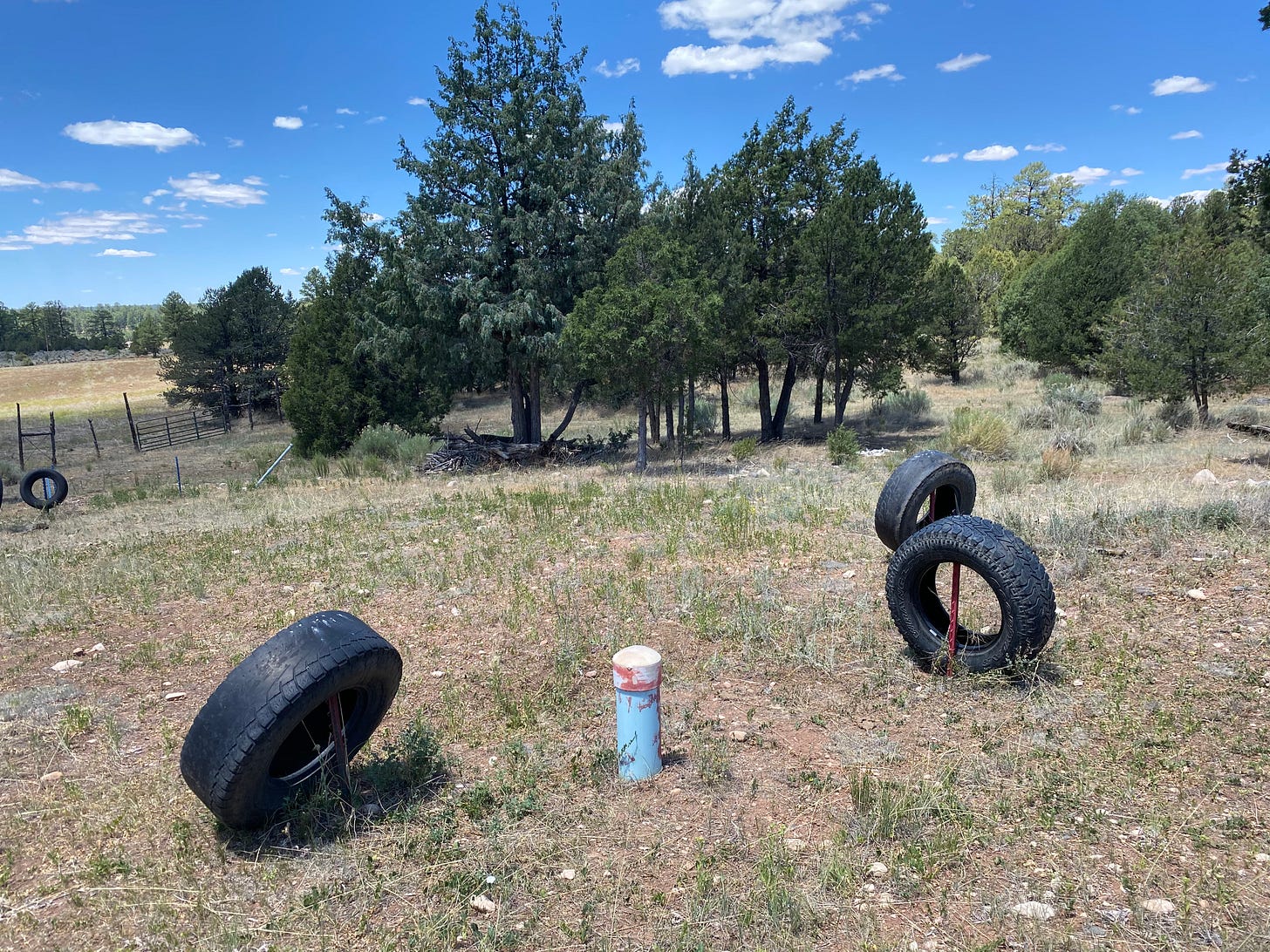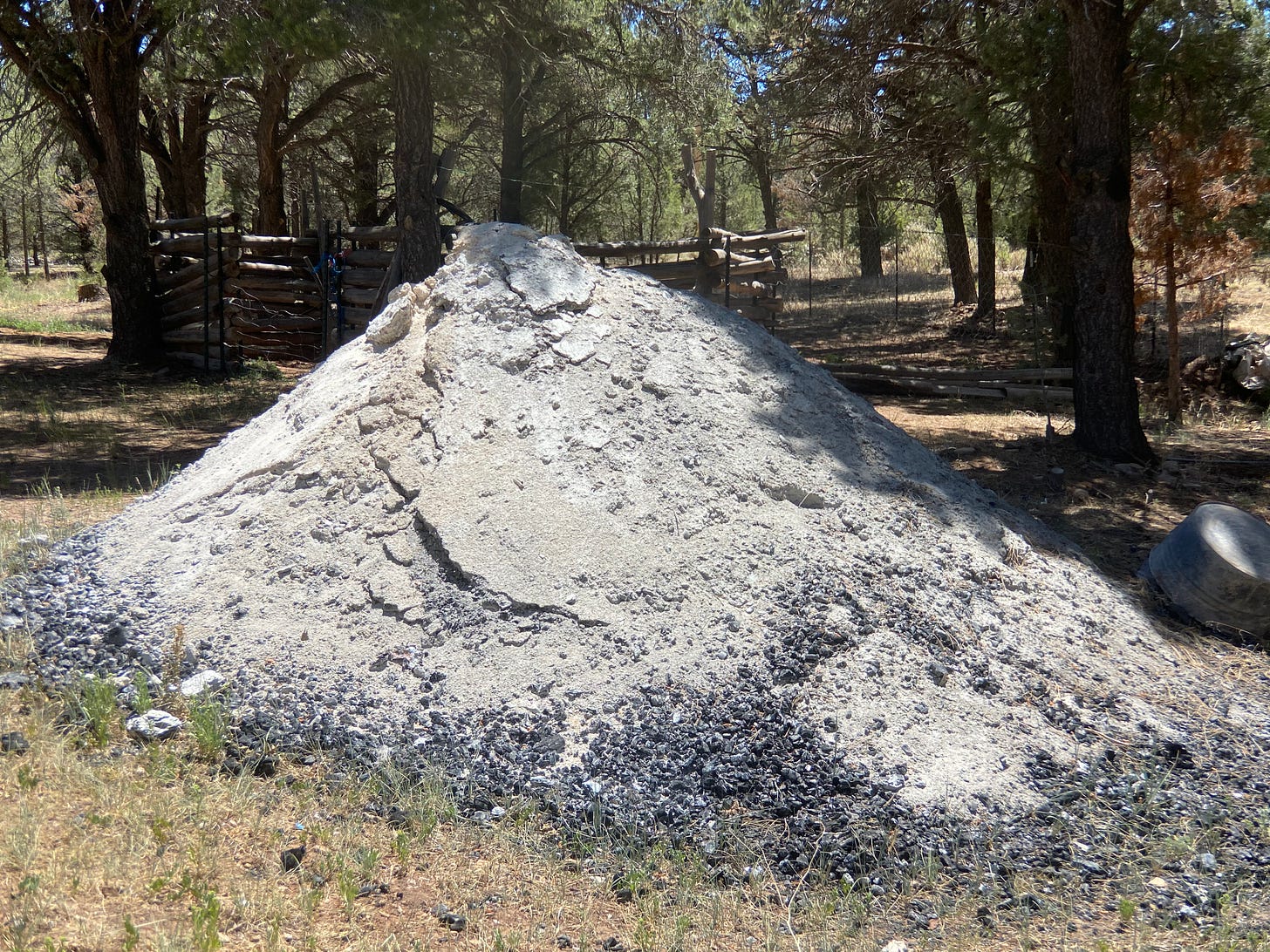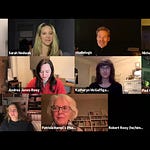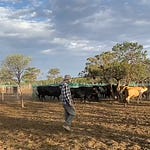This is one of the worst audio engineering failures of my entire trip. It was windy up in the mountains, and I’m thankful for the subtitles — otherwise, you wouldn’t understand a word. The chapter, below, also makes things clear. Sachie doesn’t say much in this video, which was her choice. When she wasn’t being filmed, we talked a fair amount. She’s interesting and hyper aware.
The following excerpt from my yet-to-be published nonfiction book, An American Family, tells the story of how I met these two characters, who are among my favorite people of all time.
Frankie and Sachie Are Lovers
Poking around AirBnB I found a traditional Navajo hogan for rent in the mountains outside of Chinle, Arizona. The hosts’ profile suggested they were a Navajo man and a Japanese woman. Using the tex in the app I introduced myself and asked if they’d be up to talking about their lives and the crisis they’d been living through. The virus had hit the Navajo Nation particularly hard.
“We might do that. I will talk to Frankie,” the woman, named Sachie, replied.
It’s said that all journalists are, at heart, deceivers, and manipulators.
I agree with this thought. A big part of my job is behaving in ways, different for each person, that encourage someone to trust me enough to share their story. I’ve been doing this as a journalist for 40 years. Finding pathways to invading people’s privacy is now part of my being.
The next morning my phone pinged as I power walked through the early Chinle light, a short text from Sachie.
“Frankie will be at your hotel at 10 this morning.”
It was just 7 am, so I had plenty of time to prepare.
“I’m in room 9.”
“He is a cultivated man and will not come into your room, but he will talk to you outside,” she said.
I had planned to interview him at the table in my room, in front of the window looking onto the parking lot where a white family gathered in their folding chairs. It hadn’t occurred to me that this might be improper.
Back at the hotel I said, “How’s it going?” to the white family.
“Cool,” the father said.
Who were they? I’d stereotyped them as being closed-minded right-wing types who saw me as a pointy headed city dweller with no cajones. But they could just as easily be rural Bernie Bros. Or American Romani. I had no idea. I’m sure I thought about them much more than they thought about me. I sat at my table and waited for Frankie.
Around 11:00, a copper colored late 80s Oldsmobile with opera windows slowly approached, like something out of a Tarantino film. As the car rolled past, the driver, masked and wearing a big hat over a blue bandana, stared intently at the unmasked parking lot partiers from Wyoming.
Someone had dipped a hand in white paint and made a handprint near the car’s opera window. An indigenous symbol of healing. This had to be Frankie.
He stopped his car, and took in the scene. Three white dudes and a lady sipping beers in a parking space and a couple of tow-headed kids running circles after a playful crow. And Frankie. He was older than I expected, with deep lines around his highly observant eyes. Fifteen seconds later, without so much as a tip of his hat he did a U-turn and drove slowly away.
What the fuck? Did the lot lice just lose me this interview?
I texted Sachie: “Does your husband drive a copper-colored car?”
“Yes, that’s his antique car,” she replied.
“I’m not sure what scared him off, but please tell him to stop by again.”
“Maybe he’ll fill up his tank and come back – wait a while,” she replied.
I gathered a cookie and a coffee from the hotel lobby. This was all I’d eaten since the night before when I’d had a cookie, chips and coffee. I checked on the Internet and found that Denny’s was the only place in town serving meals these days, thanks to the virus. I’d have to wait till after Frankie left for the pleasure of ordering a patty melt on my phone.
An hour later the copper-colored car returned and parked near my room. The Wyoming crew was down to just the grandparents, quiet and smoking in their lawn chairs. I stepped out to greet Frankie before he could run away. He looked up, annoyed, and I realized I wasn’t wearing my mask. I pulled it from my pocket. He got out of his car wearing blue jeans, leather shoes and a buttoned shirt. He had a fabric mask layered over a surgical mask, a floppy straw hat and deerskin gloves. He wouldn’t look at me, only to the side.
“What is it you want?” he said, staring down at his car.
“I want to hear your perspective on the virus, and on the state of the world in general,” I said.
My words were so stiff. What I really wanted to know was this: why do all the Navajo look so wary when I approach? Do they see that I carry the DNA of every generation that has tried to destroy them? Why am I making this all about me?
He looked doubtful about the prospects for our conversation, and I didn’t blame him. It was already 90 degrees and the sun beat down. Occasionally a car pulled in and out of the parking lot, and the loud wind carried grit.
“I don’t know,” he said, “The world is a big place.”
Each word tumbled around in his mouth, each consonant a new sentence. I. Don’t. Know. The world. Is. A. Big place.
“I lived in Japan for 7 years,” he said, “I speak Japanese. My wife Sachie is Japanese. Did you know that Japanese and Navajo have similar sounds? They are related. Japanese people and Navajo people also use similar gestures. I believe it is in the DNA. This is what I was thinking about last night. The DNA was spread between the people.”
“That makes sense,” I said. But did it?
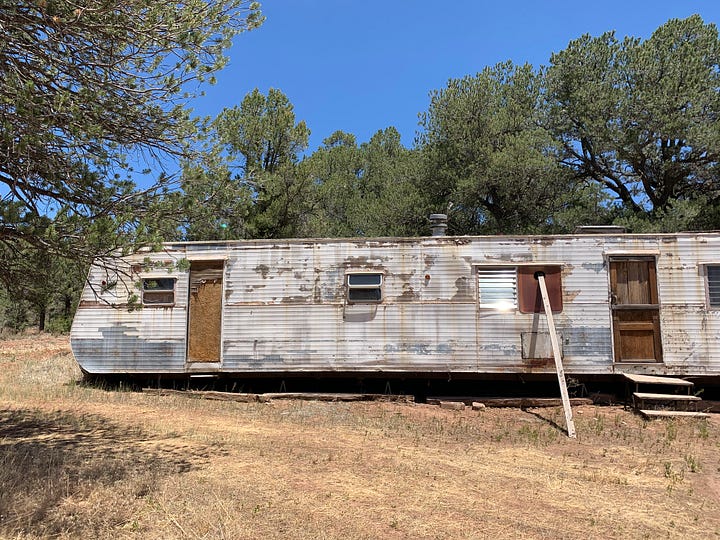
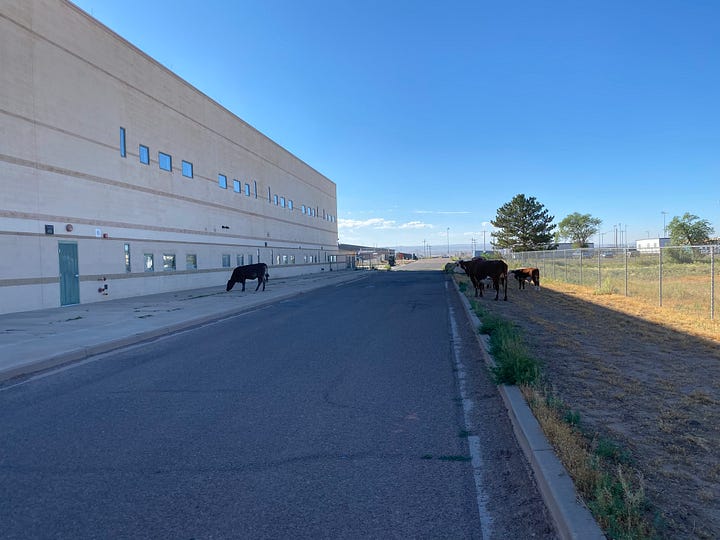
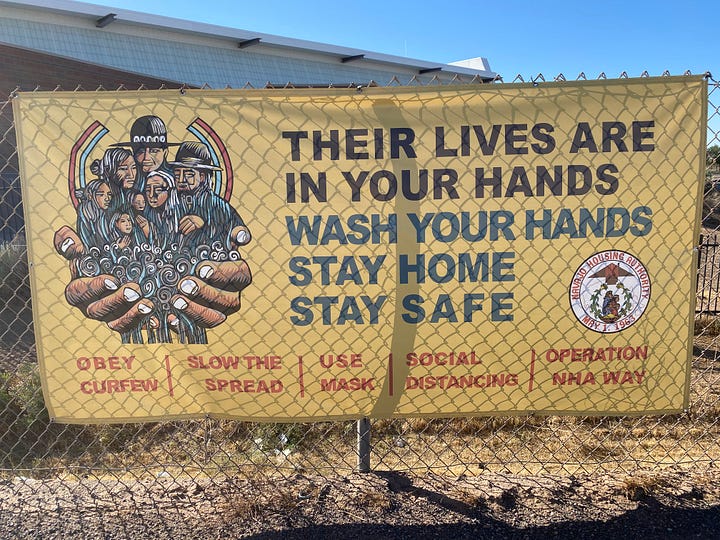
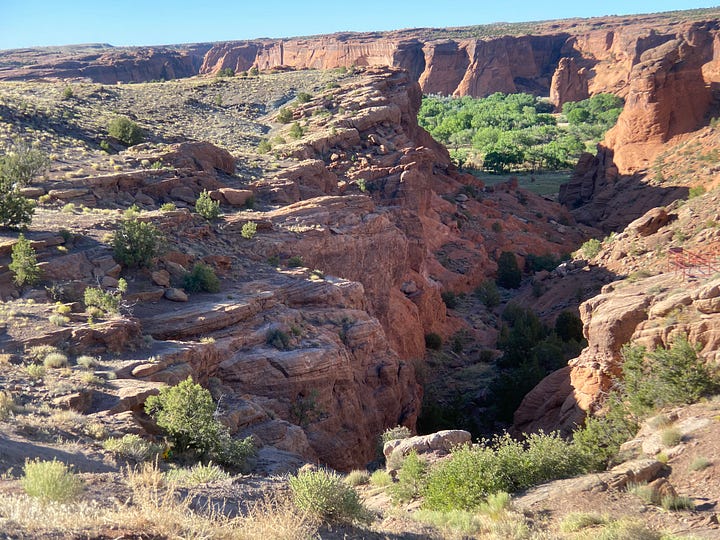
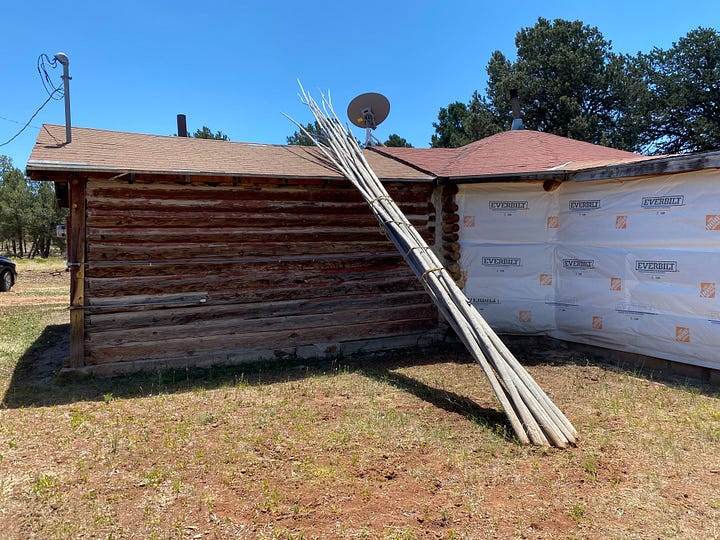
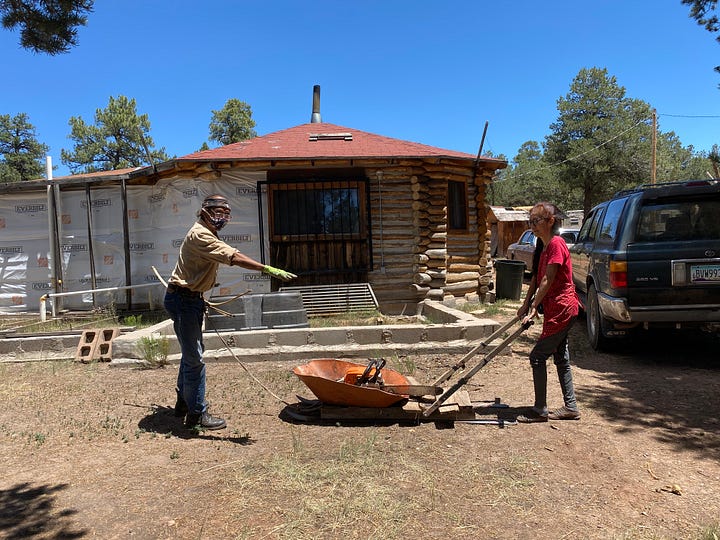
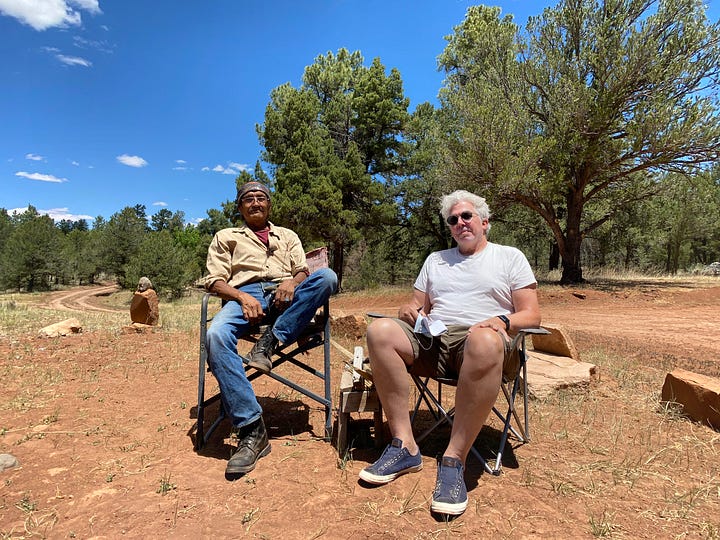
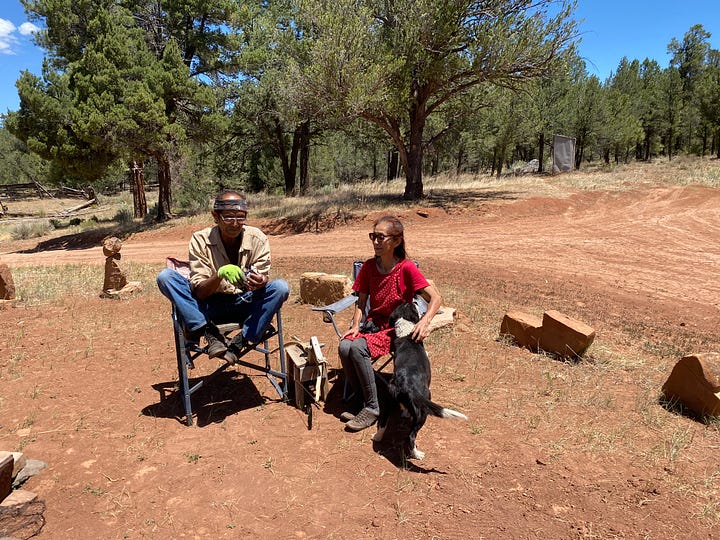
We stood, distanced.
“I don’t know anything,” he said, out of the blue.
“Really?”
“You tell me – have you heard me say anything important?”
“I don’t know,” I said. “I’m not really looking for important. I’m looking for you.”
He was silent for a long moment.
“Ok, I’ve given you my fifteen minutes of thoughts,” he said. “Can I go now?”
We’d actually spoken for three minutes or less. I said I was hoping we could talk some more, that his wife said he had a lot to say.
He brushed that off and took our conversation in a new direction.
“I am getting good at shooting my bow and arrow,” he said.
“Oh yeah? That’s a hard thing to do.”
“After 25 years I’m finally hitting my target. I made my own bow.”
“Really?”
“Look at it,” he said pointing to the back window of his car. A hand-carved bow rested on the shelf below the window. Oak.
“It is exactly like the ones Geronimo made,” he said. The same curve. The same purpose. I studied a photo as I made this one.”
He stood back from me, nervous about the virus. He was the most socially distanced person I’d met on this trip. At times it was hard to make out his words through his masks, in one of which he’d put a double layer of coffee filters, for extra protection.
“Did you know that Custer was dead before they crossed the river?” he said referring to the Battle of the Little Bighorn.
“No, I did not.”
“That whole thing happened without him – he was dead.”
“Why are you telling me this?” I asked.
“I was there,” he said.
“You were there?”
“Yes.”
“You were there in a past life? Or you were there in a memory?”
“I do not know,” he said, “It was inspired by Sitting Bull.”
A pause. I didn’t know how to respond. Was Frankie a nut? A genius? Manipulative?
“Well, now you’ve had your 20 minutes with Frankie, I can be on my way,” he said.
It had been 5 minutes, at the most.
I asked how he felt about the virus.
“I do not like to talk about it, because so many have died. It is not to be talked about.”
I said I understood. I respected that. We were silent.
“But I can tell you something,” he said. “I feel a pull to the ocean. I might move to the beach.”
This surprised me, and I asked where.
“To the islands of Washington,” he said. “I have my own ways. I am Indian.”
“I can see that.”
He chuckled. We were silent.
“Well, now you’ve had your 30 minutes with Frankie Spencer. May I leave now?”
It had only been about 7 minutes.
“Of course,” I said.
“You know where to find me.”
I didn’t, so I gave him my number on a piece of paper.
“I don’t use the phone,” he said. “Maybe my wife.”
He got into his copper-colored Olds and pulled away.
Aspen called, rare to hear her voice rather than read it on text.
“It’s good to have Violet here,” she said.
Violet was living at home now, riding out the pandemic and working as a studio assistant to a photographer whose art she admired.
“I’m doing well, but it's good to have someone around,” Aspen said.
She told me the protests were ongoing, though she wasn’t joining as many of them. Her ideas about them – how effective they were, whether she even had a right to join a Black Lives Matter protest, what kind of future any of us had in this world anyway – were complex.
I described Chinle and told her I was finding the local people hard to strike up a conversation with, unlike in other places I’d been.
“Well, look at yourself,” she said.
“Yeah,” I said.
I examined my hand. Long, strong fingers, wrinkly knuckles, liver spots and red blotches and veins just below the pink and pale skin. An old White guy.
“I wouldn’t want to talk to you if I were a Navajo in Chinle right now, trying to avoid the virus.”
“Yeah, the virus levels here are pretty scary,” I said. “But I can’t infect anyone – I don’t think.”
“Just be yourself,” she said.
Aspen knew all about finding herself. I admired her for that.
“Do that and people will want to talk. You’re very likable,” she said.
I loved receiving advice, for a change, rather than giving it.
That night Sachie texted:
“Frankie liked talking to you.”
This was a surprise, as Frankie had seemed eager to get the hell away from me.
“He says to come to our home tomorrow,” she wrote, “Drive to Tsaile, to the T and turn right. You’ll see a big tree on the left. Keep going. When you pass two boulders on the right, you’ll see three big trees on the left, look for Frankie and he’ll take you to where we live.”
Approaching the T, I saw the chrome nose of his Olds poking forward from a gas station parking spot and pulled over. He motioned me to follow and roared out of the gas station. So, he was a rule changer, I decided, reliable and unreliable at the same time, agreeing to meet me but then changing the meeting spot without warning. I followed him down the two-lane at 75 miles per hour and then onto a dirt road up the mountains to 7,200 feet. His rutted driveway led down to a trailer, a pickup truck with no hood, a few very furry dogs and an eight-sided hogan made of logs notched and fitted and sealed with chink. There was red dirt everywhere.
“You will not see the inside of our hogan,” Frankie said. “The hogan is a special place.”
A large dirt lawn was dotted with a fire pit, an old wood stove, a sweat lodge made from willow branches, tipi poles without a tipi and several old tires suspended on stakes. Frankie said the tires kept people from being hurt by the upright stakes, but he never explained why the stakes were there in the first place
.
Sachie came over. She was diminutive, middle-aged, and spoke with a Tokyo accent.
We sat outside on folding camp chairs around the rusted wood stove which vented about five feet towards the vast blue sky. Was this plein air stove meant to heat the whole mountainside?
“I’m fixing it up,” he explained.
Sachie leaned forward with her hands clasped. She said she first met Frankie as a tourist at an Arizona dance hall in 1989 and they’d danced together ever since.
“I came here because I was interested in Indians, what it is that makes an Indian tick,” she said, “It’s a spirit from a long time ago that went into hiding and now comes up.”
“Everyone wants to know what that spirit is,” said Frankie, “Especially now.”
I nodded.
“You too,” he said.
He was right. I, for sure, was a tourist among the Indians, with my thoughts that grew out of myths and cliches passed down from my 17th century ancestors who’d invaded Naumkeag lands, to the 19th century ancestors who farmed Kanza land in the territory they called Kansas, to the present moment, a small, unkempt homestead where I tried not to be the guy who inquired as to the secrets of the magical Indians. Keep your ears open, I told myself. Frankie has something to say.
A few years after meeting, Frankie and Sachie left Arizona for Tokyo. Frankie practiced silversmithing in a traditional Japanese atelier, and they lived there together for seven years.
“When I heard Japanese people talk, the sounds to me were like someone speaking Navajo backwards,” Frankie told me, “I felt a connection to Japanese culture.”
I pictured Frankie walking tall along Tokyo sidewalks. I lived in Japan for a while when I was 24 and had been struck by how passionate some Japanese people were about meeting foreigners. Frankie said he did feel bit like a celebrity in Tokyo at times. Eventually, they returned to Arizona. Frankie fixed up the hogan on land that his great grandmother had homesteaded long ago, wrangling a title out of the government. They worked at this and that, translating documents, Airbnb, whatever would make a living. Frankie, in particular, is not a fancy person. Work shirt, jeans, boots, bandana, and a hat. At home, they often spoke Japanese, because Sachie still felt uncomfortable with her command of English and Diné.
Frankie held the bow he had made, along with three arrows he’d bought at Walmart before modifying the shafts with chopsticks to which he attached new, more lethal tips.
“Walmart?” I asked.
“Yes, Walmart has good feathers,” he said, lilting up the end of his sentence to indicate that I had a few things to learn about the world.
“Chopsticks?”
“You do what you do,” he said.
He wasn’t an expert bowman, by any means. He could hunt rabbits with the fancy compound bow he had in the house, but he’d never much used the type of bows Geronimo used. He was teaching himself.
“I need to use my third eye or my long-ago DNA, and maybe I can strike the target. I can access the skill from my ancestral past. It’s been asleep for 7 generations right now. We’ve been living on this damn reservation for a long time and it's about time we use the bow.”
I was beginning to decide that Frankie wasn’t wacko. Rather, he was someone who thought and spoke completely in metaphors, similes and, sometimes, fantasies. Not crazy, for sure, but I had to keep my brain loose to follow what he was saying, basically: we humans are in a very bad spot and we Indians have it worse than most. If all of us don’t learn from the ancient systems soon, we’re screwed.
“You, Stephen, need to write that down,” he said.
To survive the pandemic, he and Sachie had isolated themselves on this mountainside. I was their first visitor in months. They hid, they hibernated, they stoked the fire when the temperatures dropped. They wore masks and imagined how they might survive in the future. For Frankie, the virus had reinforced the value of learning the old ways.
When he was a child, the government sent him away to an Indian boarding school.
“All of us – every one of us children,” he said, “We are used to what the government does to us. We lost a lot of our culture in those schools.”
He was working to get it back.
Frankie wore a lime green plastic glove on one hand for protection, the other hand was bare. He waved his green hand slowly in front of his face to indicate the virus. He believed the virus was airborne, and it was awfully windy in his yard. The virus could land on his gate. It could land on the door. It could land on the tip of your nose.
“If I dip my arrow in horse manure and shoot it, that’s germ warfare,” he said, “I think the Navajo nation was picked out for this virus because we are black – meaning we are red. They also picked certain types of White people to infect.”
“The government did?” I asked.
“I have no idea.”
“What?”
Back in March, when it all began to get really bad, he heard a sonic boom in the sky above his hogan. Then another. It was a missile, he said, they were test-firing something. Then he saw a B1 bomber that he thought looked bigger than a 747, fly over. He’d never heard the boom or seen the plane before. Coincidence? Who knew? Maybe not. Could be. Makes you think, doesn’t it?
At times Frankie seemed to be speaking in Zen Koans. But this was just the way his mind worked, like the old video game Pong, but slightly on the fritz. I had been pretty good at Pong, years before.
Sachie pointed out a 7-foot-tall pile of gray ash behind their hogan that Frankie called Mt. Fuji. Ash from all the times they’d cleaned out their wood stove over the last ten years, it was a clock showing the passage of the seasons.
“Our neighbors laugh at it,” said Frankie, “But you don’t need a clock unless you believe in the future.”
“So, you have hope for the future?”
“Yes, I have hope.”
Then, much to my surprise, he invited me inside the hogan. He said he wasn’t quite sure why he wanted me in there, but maybe he trusted me. The three of us stepped into the cathedral ceilinged space, a rustic octagonal interior with dark wood kitchen cabinets and a table, a desk with a computer, and a room off to the side where the couple slept.
“For us, the hogan is a sacred place,” he said.
I felt honored.
Out of the blue, he asked me to explain why the new version of Microsoft Word required a yearly subscription.
“Oh, I see,” I said. “You just invited me over for tech support.”
He laughed.
“I think you were sent here to spread the word to the larger world,” he said.
“Word?” I asked.
Sachie spoke up:
“He asked me this morning ‘why am I telling this guy to come to our house,’” and I said, ‘because you feel you should.’”
“It just dawned on me that’s why you are the first person we have invited here since the whole thing began. You are a voice for my thoughts,” said Frankie.
It turned out that when he pulled up to the hotel the previous day the Wyoming people had spooked him. Bad energy. No masks. Lots of beer. So, he drove up above Canyon de Chelly to scope out a cave where he thought we might be able to talk in peace. But the cave didn’t seem right, so he returned and spoke to me, warily, as the Wyoming family watched.
“I knew I wanted to talk to you,” he said. “But I couldn’t with them around.”
“What is the word you want to share?” I asked.
“That hope that I mentioned. Hope. That’s it.”
His father had fought in the Korean War. But not as a Navajo, Frankie said. He’d fought with everyone to survive together as American people. Frankie thought that same sense of unity would reappear in this country. Some day. That people would work together. The country would be better. “I have hope as long as the grass is green,” he said, standing in his denuded yard.
Sachie, as usual, nodded politely.
The afternoon had gone into evening and soon the sun would set. It was time for me to go, to beat the Navajo Nation covid curfew back to my hotel. As I gathered my backpack to head out, Frankie told me to wait a minute. He opened a drawer on the other side of the room and came back with a small gray crystal, about an inch and a half long.
“My mother gave that to me,” he said, folding it into my hand. “It will help protect you until we see you again.”
I held it tightly, with hope.
Driving down the mountain I stopped to look at a small herd of horses jumping about at the edge of a spring – a roan, a white pony, a dark stallion. The meadow was green, the heat of the day lifting. I tucked the crystal into a small drawstring bag and eased it into a spot on my dash. At the highway I turned left, heading south into the virus.


